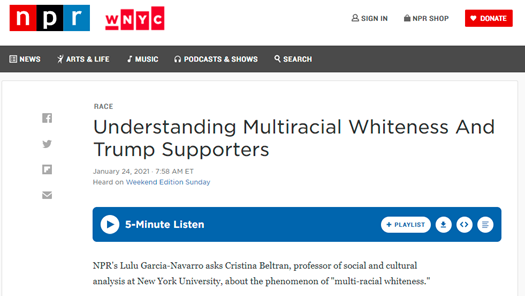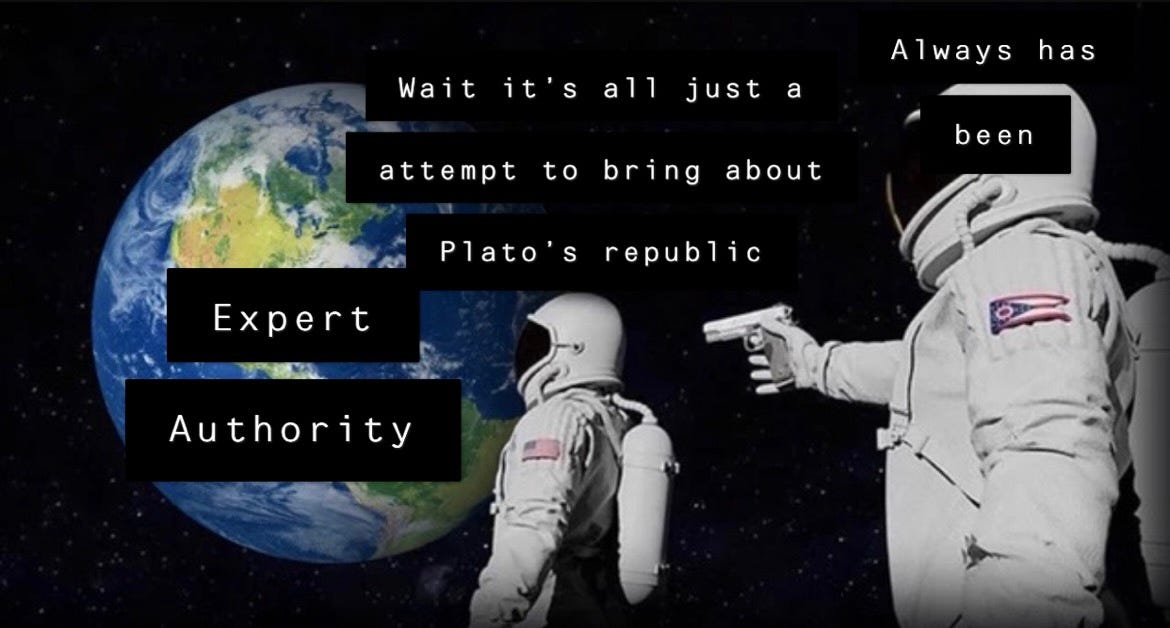Hello Fxlks - Some quick housekeeping before the piece:
1: I am changing the name of my blog from Apropos of Nothing to On Second Thought. When I first started this blog on a whim I didn’t realize that this was also the name of Woody Allen’s memoir… Not really someone I want to be associated with. Also, after further reflection I do not think it fit with my whole vibe, it feels very stodgy and doctrinaire (and I cannot stress enough how incredibly laid back, chill, and super fun I am to be with at parties). So I am changing this now to On Second Thought - which generally gets at the whole nature that this blog is thought in flux. I may still keep the URL, I may not, time will tell.
2: I am including an audio recording here because a few dedicated readers have requested it and also because it upsets my fiancée as I edge towards just being another dude with a podcast (Joe Rogan I’m coming for you). But please note - I talk a lot of shit online, yet I am in reality very meek, mentally fragile, and incredibly insecure. Please do not cyberbully me about the terrible sound-engineering or my lisp. I dish it out but cannot take it!
Anyway, hope you enjoy:
Escape from New York
Two months ago, my fiancée and I abruptly moved away from New York City. In the half-decade spent between Manhattan and Brooklyn, I had grown to love New York’s many clichéd qualities that better writers than I have already penned: its vibrant energy, its numerous quirks, its take-it-or-leave it manner. However, besides these aspects, there remained some less appealing facets of New York City life that had and continue to irk me.
New York is a city of strangers – neighbors who completely lack faith in each other, and perhaps even themselves. The multitude of cameras covering every square inch of the city are evidence of this – they stand to ensure that there is never to be an unsupervised moment. It is a place where many think of themselves as part of some nouveau counterculture that is sticking it to the man – yet their day-to-day actions comprise a nervous, obedient rule-following and general deference to experts and authority not their own. I would see daily in conversation, on social media, and on the news New Yorkers decry that there was not enough oversight in the city, there was not enough rule following, there were not enough systems and institutions. What were needed were more cameras on buses and traffic lights, more regulations over more of areas of people’s lives, more ways for others to tell them what to do and how to do it. In short, it is a city under a boot, one which every individual is compelled to greet with their tongues out.
On my last night in NYC, I got into an argument at a bar with a friend about our difference in opinion on this way of living. The argument at bottom centered around whether or not people should be allowed to make their own mistakes. My friend, and the general zeitgeist of the city were sharply against the notion. Even though the New York scene may represent an extreme opinion on individual human volition, it represents in a microcosm a general shift coming across American culture towards expert and authoritative deference. The appeal to abstract authority which has become preeminent throughout the political spectrum is evidence of this. Where one side commands people to “trust the science” and government bureaucrats the other side urges people to “back the blue” of law enforcement and trust corporate managers – it is evident that individual volition is not a welcome input into shaping our world.
While both sides scream at each other over their preferred flavor of the same ice-cream, in the mainstream cultural channels and media there are little to no fundamental critiques or examinations of expert deference, what it stands for, and its effects. As I hope to trace out in this piece, under actual scrutiny, a preference for authority and experts brings about effects and ends that cannot be ignored and may even warrant their rejection.
Expert Homogeny
Expert deference is de facto an act of centralization, homogenization, and concentration of activity. Urging people down one, or even just a few narrow paths, erases the plurality of actions, thoughts, and opinions that would have existed otherwise. In this manner deference to expert authority is also synonymous with scaling and leveraging effects, as one voice holds sway over many, thus one action is much more far reaching and impactful, for better or worse.
Following experts and the term “expert opinion” are simply a more stylistic manner of presenting deference to authority and urged uniformity. The natural antithesis to following outside authority, is self-directed action and individual judgment and thought – this does not preclude people coming to consensus, but only that such an outcome is not the result of dictums, requests, or nudges form up high.
Under this light, many pertinent topics and cultural debates shine a different hue. For example, the yearning for diversity and inclusive representation now seem more like a pathetic masquerade – for though they look to bring in people with different external appearances or sexual proclivities – there is still a general overall appeal to homogeny in outlook, political stance, and actual actions. For timely examples, look at the blowback to comments made by Dave Chappelle and Kanye West, or examine the mental gymnastics taken to propose that racists would actually vote for black candidates or the concept of multiracial whiteness to hush divergent minority thought.
Legibility, Scale, and Systematization
Before I examine the direct effects of expert guidance there are other further related aspects that I would like to trace out namely legibility, social science, and bureaucratic administration. In Seeing Like A State, James Scott describes how centralized authority maps and achieves its goals. Systems and institutions, especially large ones, can only direct their goals and orient themselves around what is rational, objective, measurable, and statistically scalable – or as Scott puts it what has legibility. Governments being conscribed to enforcing actions that are legible (i.e. orderly and measurable) actually shapes and influences how a population sees and interacts with itself. As examples, Scott lists out numerous cultural artefacts that legibility has left us with including birth certificates, social security numbers, zip codes, DNA sequencing, even formal and static surnames.
Legibility and expert deference go hand-in-hand, as deference to expert authority demands centralization and centralized institutions operate towards legible goals and entrench legibility in a population. It must be noted that legibility is not a particular matter of right or left politics. Both the far left communist and socialist ideal of a large state and an idealized free-market realm of behemoth corporations envisioned by the right will look for the same forms of legibility and thus the same ends (though one (ostensibly) with a profit motive, and the other without). Being a political scientist, Scott titled his book Seeing Like A State, but it just as easily could have been named, seeing like a corporation, or seeing like a philanthropy. Any institution will have the same outlook, and ultimately behave in a similar manner to attain goals.
Legibility is intimately related to the scale of institutions. The larger the organization and the more expansive its projects, the more centralized authority and control it will look to gain and the more legibility it will demand from its subjects. This is why trillion-dollar stimulus bills come at the same time as pushes for the mass-surveillance of banking transactions and universal patient health identifiers. Expert authority, if it is to really know best, cannot have any secrets lingering amongst the population it looks to guide. You cannot decouple an ambitious top-down social goal from an equally ambitious top-down push for order, compliance, and submission.
Science Contra Humanity
The steady march towards legibility in the post-classical western tradition has culminated in the creation of the social sciences. These disciplines – in a shallow mimicry of physics and chemistry – are the ultimate attempts to impose the rationality, rigid definition, and ordering of legibility on to society as a whole. As Scott notes, with the advent of social sciences “the existing social order, which had been more or less taken by earlier states as a given… was for the first time the subject of active management.”
Social sciences look to abstract away all the of the unique and bespoke facets of individuals and to deal with them either as masses depicted by lines and shaded regions on graphs, or as idealized abstractions of “average” men or women. People are no more dealt with in these fields than are particles, personal character and individual history are replaced by distribution and arithmetic mean. As Stalin noted, “The death of one man is a tragedy. The death of millions is a statistic.”
Is it any surprise that social sciences are a synthesis of forced legibility and coerced reliance on expert authority? Social sciences demand specialist knowledge, divorcing human life from actual living and dividing and siloing the many facets of human affairs into academic and professional jurisdictions, where they will be subject to the hoarding, gatekeeping, and turf wars familiar to all bureaucratic institutions.
There is truth to the idea that there will always be someone more knowledgeable than you or I in some realm or field. How can that not be the case, when so many people place themselves in the unenviable position of toiling away lifetimes seeking to understand the biochemistry of how proteins synthesize, or the theoretical market dynamics of used cars. Of course there is someone who ostensibly knows best. And forcing everyone to blindly follow the words of these people may indeed (in the short run) lead to more orderly, cleaner, and more efficient outcomes.
However, while much may be gained by following the legible experts, there is still much to be lost. Experts, central authority, legibility, social science, statistics, perhaps even the whole of technological society lend themselves to outcomes based on efficiencies and legible benefits that exist at scale – but also wash away the thousand little truths, intimacies, and realities that only can exist for each individual. There is no mass way to measure, track, and grade the areas of life that we know in our soul to be crucial. Sere reductionist language or schema can never capture values like love, intimacy, care, courage, dignity, and valor. These are inevitably elided from systematization.[1]
Experts contra Democracy
The stale and doctrinaire realm of social science is the bedrock which administration and bureaucratization of human affairs rest upon. It is the alleged specialized proficiency gleamed in these realms which are used to justify the formation of organizations of experts, organizations believed to work better in guiding and shaping the most intimate personal affairs of people’s lives. When people say “trust the experts,” they are often speaking of the individuals who hide behind titles, badges, and certificates of these organizations both public and private.
But public administration and bureaucracy in general are worth examining as their proliferation and divorce from feedback mechanisms can harbor nefarious effects and ends. Woodrow Wilson before becoming president, was regarded as one of the founding shapers of the study of public administration and policy. In his seminal thesis, The Study of Administration, which would guide his ideology and actions throughout life, Wilson bluntly stated that the goal of an administrative apparatus is to divorce decision making and action from the democratic influence of public opinion.
Perhaps the most genius idea to come to the forefront in the enlightenment was the conception that power corrupts, and absolute power corrupts absolutely. The division and balance of powers built into the US government was a direct result of this. The US Government was designed to work and change slowly in order to combat despotism and tyranny. However, the advent of administration circumvents this failsafe and concentrates power and decision making in singular bureaucratic bodies.
The advent of expert administrative rule, especially at scale, is inherently a non-democratic mechanism where input and feedback to the central authority in control may or may not be present. The entire point is that choices are made in areas far away from the actual people effected and without their direct ability to change what is happening to them
Despite massive swings in public opinion as exemplified by the overturning of the President and Congress over the decades, and the shifts in the priorities, wants, and desires of the populace this implies. Many bureaucrats have been in the same seats, making the same decisions, and guiding lives in the same ways, while direct representative mechanisms have been completely absent.
Further, a bureaucratic institution’s claim to expertise is in some sense self-thwarting. Bureaucracies favor those good at internal politics and maintaining facades over technical proficiency. In this way, leadership positions at bureaucratic institutions are likely stronger indicators of gamesmanship if not outright psychopathic tendencies than expertise.
This effect in the public sphere in the US and with supranational institutions like the EU is mimicked in the private sphere as well with the creeping growing powers of behemoth corporations like Amazon, Apple, and BlackRock which are slowly gaining control over more facets of daily life.
An Idealized State
The wanting for experts to guide and shape a population in minute detail is not a novel idea, its lineage traces back millennia and will likely be with us so long as human thought continues to exist. Yet when the idea is not checked and allowed to run amok dangerous and creepy phenomena begin to take place. Looking back at the history of those who preferred that human action and decision making rested in expert hands, their idealized state has some rather unsettling characteristics.
As I mentioned before, putting supremacy on experts naturally leads to a push for legibility and scientism at the exclusion of many human aspects. We are left with a dead world of cold materialism – one that is rational, ordered, and efficient – but only those things. Common traditions, familial bonds, religious belief are primarily seen as anathema, or at the very best as superfluous excess, which can only stand in the way of more efficient and productive ideals.
In Plato’s idealized republic families were to be disbanded. In the Athenian philosopher’s vision, children would not be allowed to live with their mother and father but rather were to be forced to live in common while adults could only come together to mate on rigid schedules. 2200 years later the central tenant of Fichte’s goals for a systematic expert led education system that would revive a prostate 19th century Prussian nation was that children were to be removed as much as possible from family and the influence of tradition. Both of which could only stand in the way of expert guidance and their aims. The present day sequestering away of the young in age segregated schools for the majority of their time is the residue from these two great thinkers.
The outlook on humanity of the large technocratic regimes of the 20th Century under the Third Reich and Soviet Union speak for themselves. Under these systems all basic tenets of human connection not overseen by state apparatuses where violently crushed or dismembered. But on a more recent note, The World Economic Forum has its own goals for the “family of the future” an envisioned set of relations idealized for a world where families are “geographically separated,” “unmarried,” with roles that are a combination of both work and family. But no worries necessary as they envision these families of the future will be “more connected via mobile technologies.” Similarly the Council on Foreign Relations notes that the “demonstrated high return on investment” of access to family planning experts, demand it to be a “critical objective of U.S. foreign policy.”
Counterargument(s)
Common arguments in favor of expert deference and against individual self-guidance are usually two-pronged. The most frequent first point is that people will hurt or hinder themselves. I do not contest this point at all – people will make mistakes if you let them. The crucial aspect being that these mistakes are their own. Allowing human beings to guide their own lives and affairs is a vital necessity that will be explored later, the crux of it being that without self-guidance human spirit crumbles. As most parent know, in raising a child you must let them make their own mistakes, that is how growth is achieved.
The second argument, which is a bit more nuanced is that these mistakes not only affect the person making them, but also impact others. Thought it may seem counterintuitive this negative aspect is actually a feature of expert deference. A centralized world demands specialization and thus interdependence, it leverages expertise and makes people dependent on others and not themselves. Only in such a world can one person’s wayward actions have wide-reaching negative effects. Interconnectivity brought about from the complexity of centralization, systematization, and scale are self-reinforcing and self-actualizing in this manner. Only in building expert-led centralized systems, do we actually create societies where one person’s failure has large negative consequences.
Expert deference actively looks for scale and interdependency. The counter approach should naturally go the other way. If we do not naturally look to scale outcomes and institutions but rather opt for pluralism in activity then we limit the blast radii of all actions. This is crucial, a counter approach to expert deference must be intensely local and self-limiting. When it comes to individual decision making, the smaller the better.
The hyper paranoia around collateral damage from wayward non-expert decisions is common in mainstream media and conversation. The idea is often presented as such: if a person does not follow the plan then he or she will be less efficient (the horror!), and that inefficiency has consequences that will affect others. Think of our hypochondriac approach to nursing abstract economic measures like GDP or the index points of the S&P500, any impediments to which are seen as sacrilege or outright evil. A similar favorite rhetorical trick and thinly veiled but shallow threat commonly used by politicians is that “people will die.”
Another pertinent juxtaposition of centralized vs decentralized or global vs local responsibility is in the response to the outbreak of SARS-CoV-2. In which people wasted nearly a year waiting for an injection that at best will provide some reduction in disease severity, instead of making lifestyle, diet, and exercise changes that likely could have led to the same if not even more positive outcomes in their lives. Where should we put the control of health? In the hands of centralized experts or should we allow people to be responsible for themselves?
Cui bono?
We do benefit from experts and their systems; however, these benefits do not come without costs. As pointed out before, reliance on experts cannot be divorced from centralization, reductionism, and idealism. Holistic approaches are left by the wayside, and even further, they are scoffed at as backwards, primitive, and as threats to the great rewards of progress. However, expert’s claims to societal benefits (and the claims of scientific and technological advancement that undergird their authority) may not seem so solid under scrutiny.
As Scott points out at length in Seeing Like A State the output of expert-led scientific agriculture paled in long-term production and sustainability when compared to the practices of local tradition, whether it was Muzhik peasants in Russia or polycroppers in Tanzania. If you look at the works of permaculturists like Shepherd or Salatin you may see that the way forward with food production that is bountiful and ecologically sound is through mass reversions away from the advancements of scientific agriculture, which harms both the environment and the eater. If we take off the rose-tinted glasses we could observe that despite all the hoopla of medical and scientific advancement, never has chronic disease (and chronic pill-popping) been more widespread than in modern times.
In contrast, the tall stature, vigor, and general health of pre-industrialized (i.e. expert-free) people is something worth thinking about. It is worth noting that the Indians of the American Plains were the tallest people in the world, Wooden Leg of the Cheyenne was measured at 6’3” and 230lbs. The !Kung bushmen of the Kalahari had abundant leisure time, much more than the average employee does today, and still yielded a more efficient food supply than French farmers did in the period before World War II. As Kaczynski points out in Technological Slavery: nearly half of urban Chinese residents are at health risks due to stress, over 19 million Americans are afflicted by anxiety, and over one-in-five children have mental disorders – meanwhile, the incidence of mental illness, distress, and suicide within Native American tribes, Kalui people, Mbuti pygmies, and other “backwards” groups are at or near zero. The general ennui of our time is worth reflecting upon – everybody feels something is amiss or wrong with our society and yet we are unable to change fundamental aspects of it. Looking at the critiques of technology from Winner and Kaczynski – we perhaps can trace out the downfall of more natural and holistic approaches to living not as being saved by technology but actually caused by them.
Beyond unintended side-effects, systems allow for bad actors to enact their malicious intents at scale. Reading Rothstein’s The Color of Law, it was jarring to witness how the systematized disenfranchisement of certain ethnic groups was put in place directly through bureaucratic institutions and expert management. The property and houses of tens of thousands of black families were seized, destroyed, or ruined because of infrastructure building projects, zoning boards, and HOA’s all expert led. The long-standing divisions in the Middle East, India, and Africa are artefacts of intentional divisions and strife from colonial rule, itself a direct derivative of Europe’s belief in the White Man’s Burden – or that they knew what was best for these uncivilized non-whites. Centralized control is a two-edged sword. Conservatives, after railing for censorship and against freedom of speech for decades when it came to flag burning, rap music, and pornography felt silenced when they were kicked off social media platforms in more recent years. Eventually the pendulum swings.
In addition to the numerous creature comforts of today – we also have to thank modern technology and expert advice for some very eerie and pernicious effects that cannot be decoupled from them. In fact, taken in this more holistic light the creature comforts come to seem more like destructive hinderances whose fundamental value must be questioned. We must ask – who really knows best?
When you rely on experts, systems, centralized control, and rules over individual volition you have no hope but for this type of hellscape to run rampant. The sick irony of the situation is that the pleas of human spirit that come about as a side effect from systematization, are exactly the aspects least likely to be heard. A system of experts cannot work to solve illegible problems. It will not be able to quantify issues of the human spirit. How can you even begin to communicate the harm that these acts impose in a legible way? Those who suffer are, as my friend Justin puts it, dogs that don’t bark – an illegible problem is barely visible to a system no matter how destructive its effects may be. Like the tip of an iceberg, the deleterious effects remain subterranean and much wider reaching than they appear – when you feel the impact of them perhaps it is already too late.
Chaos – feature or bug?
When faced with the unsettling notion that our supposed progress and dogmatic faith in experts may be causing us significant harm a common retort is that we simply have no other choice. “What else are we to do?” “If we don’t follow experts, then our society will devolve into chaos and anarchy.”
While one could call this a nervous lack of imagination or even squeamish cowardice, what it is really is an expression of faith. It is a proclamation of a certain type of belief that places system and top-down order over human nature and decentralization. It is a veneration of the former as a supreme good and a denigration of the latter as contrivance never to be trusted.
The truth is, that a legibility-obsessed mentality, one in need of objective certainty must have this type of faith, it must see expert reliance as the only glue holding our world together. Under this dogmatism the choice is clear: top-down order and expert opinion offer well-versed, legible, and rational arguments for why it would work. Further, even when it fails, it has both a handy scapegoat and a “we tried” narrative at hand. On the other side, when decentralization goes awry it looks as if the inaction or uncoordinated nature of the process itself is to blame – this inherent asymmetry is where the shouts of chaos and anarchy come from.
A faith in choice is a faith in individual human nature. Is it of any surprise that many of those concerned with faith have historically understood this? Before Christianity became the official state religion under Constantine, the early church allowed priests, presbyters, and even bishops to be elected by local congregation. Decision making was decentralized and in the hands of local volition. This spirit was rebirthed in Martin Luther’s dictum: every man his own priest – a faith in individual guidance in one’s own affairs. The crux of the issue is whether or not one believes decentralization to be a feature or a bug of humanity.
Belief in choice and bottom-up order has further implications and conceptual considerations than just not following experts. It also entails an ability of free expression outside of censorship. If you have faith in human nature then ultimately there needs to be a belief that in the marketplace of ideas good speech and thought will trump the bad, and there doesn’t need to be central or expert management of mis-or-disinformation. It may sound unbelievable, but I have proposed that genius is a common human trait that can fully blossom when it is let free with the proper tools. If one does not believe genius is common, then your only choice is system and experts, the only choice is that a Calvinistic Elect must rule over the masses of damned.
The limited epistemic viewpoint represented by platonic knowledge (i.e. dogmatic objectivity and reductionism) can never apprehend the type of logic or rationality envisioned from a lack of control. Embracing an opposite view necessitates a relinquishing of tight-fisted reductionism that strives for explicit and objective knowing. It necessitates embracing a level of perceived chaos for higher levels of order. Donella Meadows describes this embracing as a “strategically, profoundly, madly, letting go, and dancing with” chaos. Nietzsche likewise believed such a dancing was sacrosanct, commenting that even though those that dance would be viewed as insane he could only believe in and celebrate a God that knew how to dance.
Overly optimized or One-Size-Fits-None
The first quarter of Seeing Like A State is the author’s retracing of the growth of scientific forestry in what is now Germany through the 18th and 19th century. Natural forests were torn down and planted in their place were neatly aligned rows of monoculture Spruce. All other ecology was eliminated because Norwegian Spruce had the highest yield of timber, and neatly aligned, evenly-spaced, brush-free rows were simple to surveil, manage, and harvest.
The irony was that these rationally planned, homogenized, and organized forests worked for a short while – perhaps a generation or two and then abruptly resulted in disaster. The monocultures were ripe for the spreading of infestations of pests, weeds, and epidemics of disease, necessitating herbicides, pesticides, and harboring blight. And the higher yields soon waned as the trees themselves did not thrive well without other cohabiting fauna, flora, and fungi.
If this type of tight scientistic, expert-driven, and rational control can kill a forest, what will it do to groups of humans? As pointed out above, though you may make some people more efficient, productive, and legibly good in the short run through coercive guidance, something is lost as well. Nassim Taleb has noted with his concept of Skin in the Game, ill-effects often start by interceding the ability for direct feedback in a system. Over the long haul it becomes evident what the effects are by not allowing the human soul to guide its own life. A people deprived of this self-guidance quickly become dependent, despondent, bleak, neutered and above all angry. Coming out of the suffocatingly authoritarian USSR, one-in-seven Russians were alcoholics and one-in-five men died due to alcohol related causes. As I mentioned above the benefits of order are often the most visible, but the downsides are often insidious and pervasive.
After an 18-year post-war period that saw the advent of the US government’s strong-armed attempts to tighten control domestically and abroad through Project Bluebird, Operation Mockingbird, COINTELPRO, and proxy wars on every continent save Antarctica, Malcolm X remarked that the Kennedy assassination was perhaps an example of “chickens coming home to roost.” Similarly, Ron Paul judged September 11th to be “blowback for decades of US intervention in the Middle East.” John Gatto points to the advent of school shootings, including Columbine as a direct response to the continued tightening of the school system. Ted Kaczynski started his bombing spree after his attempt to flee the reach of industrial society was thwarted when developers began logging in the Montana woodlands he called home.
I am not asking for sympathy for the perpetrators of the horrific actions listed above, but I do not think we can continue to blithely feign ignorance to the fact that there is blowback to tight and pervasive control. The tighter the external controls exerted on an individual or population the more exacerbated (and violent) of a counter reaction we can expect to see in people under the boot. It may not always manifest in mail bombs, but we have seen a proliferation of violent riots and mass-shootings, and aside from external harm being done there is the advent of self-mutilation and spread of mental illness.
There are negative outcomes from people being outside of the locus of control of their lives, yet this lesson appears lost on us today. The common reaction to these horrors is often tighter control. To rail against chaos abroad we push for strongman interventionist international policies and proclaim that the US has to be a world police force. To combat domestic terrorists and mass shooters we build a surveillance state and look to remove individual's abilities to defend themselves. To halt mental illness, we push experts and bureaucrats in the form of psychologists, psychiatrists, and social workers deeper into people's lives in order to control their own minds.
The seemingly universal paradox and deep insurmountable irony is that high levels of chaos come from seeking high levels of order. I don't see a good ending here. Following calamity and large loss of life, ancient cultures the world over would sacrifice and repent to their gods because they understood intuitively that some fundamental betrayal of natural order had taken place. When our society makes each person’s life meaningless because it has become pre-scripted it is an elemental double-crossing of all that it means to be human, how can we anticipate anything but tragedy to result. Look at the advent of despair, illness, plight, and catastrophe all around and understand they are what occur from following too many experts.
[1] And perhaps we should thank God they are not included - remember Strathern’s interpretation of Goodhart’s Law: “When a measure becomes a target, it ceases to be a good measure”
















